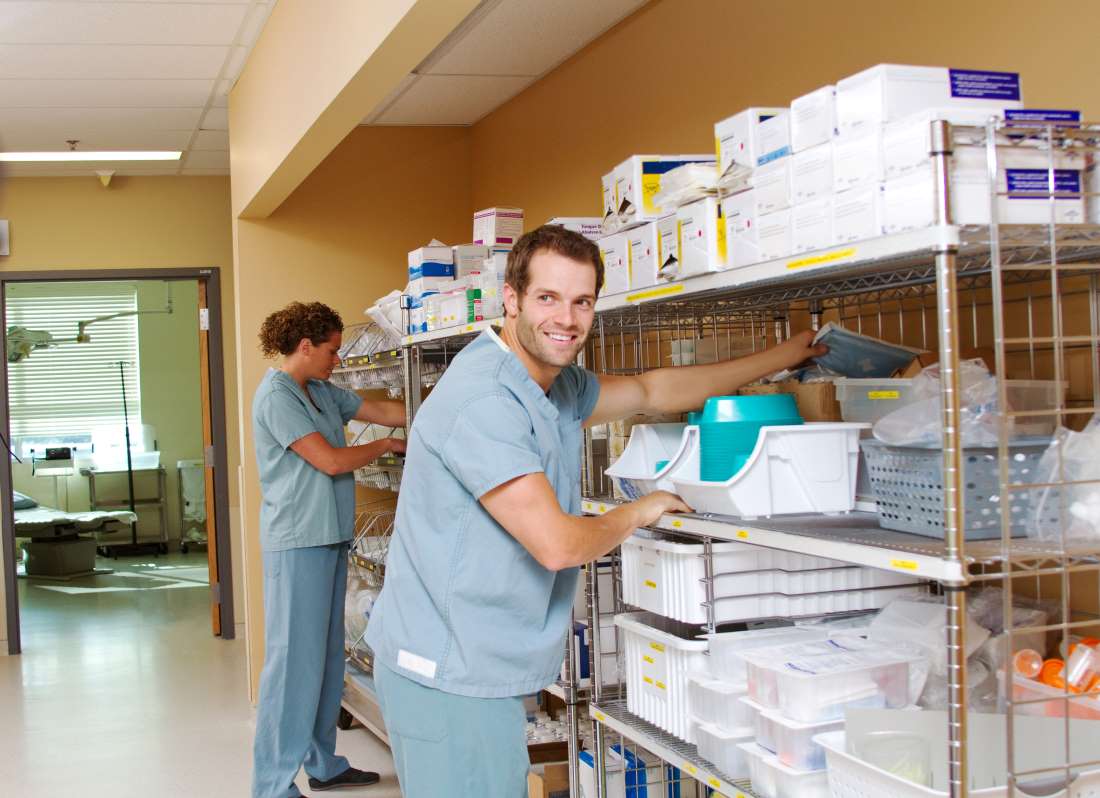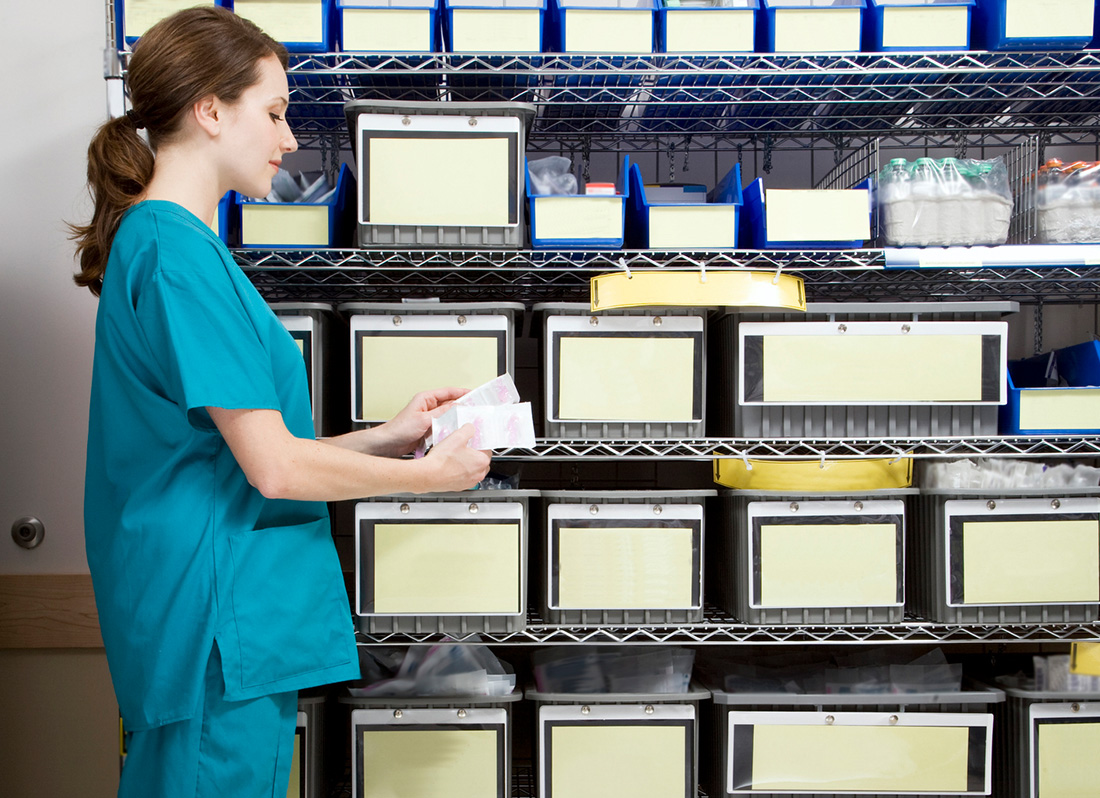Those who manage healthcare environments have no choice but to be organized. To run efficiently, everything must be in its place – with everything labeled and everything stocked properly. That should be the standard, at least. After all, how can a staff properly focus on patients’ needs if nurses, medical assistants, and custodians are frantically searching for what they need all the time? From patient records to medical supplies to personal protective equipment and more, hospitals need ample shelving and storage that is durable, flexible, and able to be secured. When a hospital invests properly in its organization and inventory storage, it keeps their operation running smoothly and creates a more structured and peaceful environment for everyone.
Better Treatment For Your Hospital Inventory.
More than just space, healthcare professionals need the kind of organizational supplies that are appropriate for what’s being stored. For example, some items like medical journals and records binders may only require simple wire organizers, while larger supplies, like personal protective equipment (PPE) and surgical equipment accessories, require heavy duty shelving or cabinets.
To reduce clutter and confusion, hospitals may use a variety of shelving types, including metal shelving, plastic shelving and wire shelving, depending on the specific needs and requirements of the facility. They may also choose specialized shelving units that are specifically designed for storing larger amounts of medical supplies or bulk racks that can hold janitorial equipment.
Shelving flexibility within a hospital setting is essential. With patients moving from one area of a facility to another and room capacity constantly changing, it’s important for hospitals to consider modular shelving. By being able to adjust your storage and customize its configurations as inventory and supplies change, you empower your staff to keep everything where it’s needed for the moment it’s needed most.
One type of shelving that is highly recommended for clinical settings is anti-microbial shelving. This type of organizational equipment can help prevent the growth and spread of microorganisms, such as bacteria and fungi, on the surface of the shelves. Anti-microbial shelving can also help reduce the risk of cross-contamination, which occurs when harmful microorganisms are transferred from one surface to another. In addition, it can help to extend the shelf life of stored items by inhibiting the growth of microorganisms that can cause spoilage or degradation.
Beyond the tools and supplies hospital staff need to retrieve quickly and safely, there are other important items that require restricted access – sensitive materials that are meant to be accessed by authorized personnel only. To that end, hospitals may use lockers to store a variety of private materials, including personal protective equipment (PPE), medications, narcotics, and confidential patient information.


• Personal Protective Equipment (PPE) As a critical component of hospital operations, it is important that protective gear is stored safely and securely when not in use. Lockers provide a secure place for healthcare workers to store their PPE, such as masks, gloves, and gowns. By doing so, they can ensure that their PPE is kept clean and ready for use when needed.
• Medications Medication has a specific and intended use and to have any of it go missing - or be used improperly - simply isn’t an option. This type of very sensitive material may be stored in narcotics cabinets so hospitals can prevent unauthorized access. Lockers also ensure that medications are stored safely and that their use is securely measured and monitored.
• Confidential Patient Information Nothing is more personal than our health records. Hospitals can use file cabinets to secure everything from medical records, test results and other personal patient documentation that must be kept private.
On a more serious note, not being organized in a hospital can have dangerous consequences. One of the main concerns is experiencing a delay in patient care. If medical supplies and equipment are not properly organized and stored, it can take longer for healthcare providers to locate and access the items they need. This can lead to delays in treatment and potentially compromise the quality of care that patients receive.
In addition, disorganization in a hospital can increase the risk of errors and accidents. For example, if medications are kept in a medication cart, there is less possibility that the incorrect medication could be given to a patient, avoiding severe consequences. Similarly, if equipment is not properly maintained and stored, it may not be in good working order when it is needed, which could also lead to delays in treatment or even accidents. Overall, being organized in a hospital is crucial for ensuring the safety and quality of care that patients receive. It helps to reduce the risk of errors and accidents and allows healthcare providers to provide timely and effective treatment to patients.
In addition to storage, enclosed bulletin boards can also be used to display important information or materials, such as safety guidelines or instructional posters. Quality shelving can help hospitals keep their facilities organized and clean by providing a designated space for items, which can help to reduce clutter and prevent the spread of infections.
At Global Industrial, we provide many of the shelving and storage solutions medical facility directors can use to help staff members be organized and make their patients feel at ease. Learn more about all the ways we can help you store everything from inventory to medicine to documents by contacting one of our Global Industrial sales representatives at 888.978.7759 or contacting us here.
The information contained in this article is for informational, educational, and promotional purposes only and is based on information available as of the initial date of publication. It is the reader’s responsibility to ensure compliance with all applicable laws, rules, codes and regulations. If there is any question or doubt in regard to any element contained in this article, please consult a licensed professional. Under no circumstances will Global Industrial® be liable for any loss or damage caused by your reliance on this article.